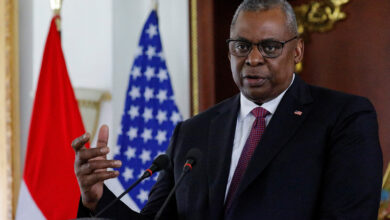WASHINGTON (AP) ― The Obama administration told Congress on Thursday it will waive democracy requirements to release up to US$1.5 billion in aid to Egypt despite concerns that the country is backsliding on commitments it made to democratic governance and rule of law.
US officials and lawmakers said Secretary of State Hillary Rodham Clinton has determined that it was in the US national interest to allow $1.3 billion in military assistance to flow. She also certified that Egypt is meeting its obligations to the Israeli-Egyptian peace treaty, which frees up an additional $200 million in economic aid, they said.
A senior State Department official said the decisions "reflect our overarching goal: to maintain our strategic partnership with an Egypt made stronger and more stable by a successful transition to democracy."
The official spoke on condition of anonymity because congressional notifications are not complete. Clinton will sign the waiver on Friday, the official said.
US officials had said last week that Clinton was poised to grant the waiver because she could not certify that Egypt was in full compliance with the democracy requirements of law.
Senator Patrick Leahy, who wrote the legislation imposing conditions on the aid, said he was "disappointed" by the decision.
"I know Secretary Clinton wants the democratic transition in Egypt to succeed, but by waiving the conditions we send a contradictory message. The Egyptian military should be defending fundamental freedoms and the rule of law, not harassing and arresting those who are working for democracy," the Vermont Democrat said in a statement.
While disappointed, Leahy urged Clinton to release the money in stages and make payments based on improvements in the situation in Egypt. Leahy is the chairman of the Senate Appropriations subcommittee that oversees foreign aid and operations.
All of the $1.3 billion in foreign military financing is obligated to pay US defense and security companies for contracts they have to supply equipment and support for the Egyptian military. Unless Clinton had issued a certification or waiver, those contracts could have been abrogated. The State Department official said there would be significant fees and penalties due to canceled contracts.
Egypt, once a stalwart US ally in the volatile Middle East, has been in the throes of transition since the overthrow of longtime authoritarian president and one-time US ally Hosni Mubarak was ousted a year ago. Worried by the potential rise of a new authoritarian leadership, US lawmakers moved to condition American aid on the government's democracy and human rights records.
In December, Congress made military assistance to Egypt contingent on a determination that the government "is supporting the transition to civilian government, including holding free and fair elections; implementing policies to protect freedom of expression, association and religion and due process of law."
Egypt did have successful parliamentary elections but concerns remained.
Fears grew in January when the government cracked down on numerous democracy advocates and groups, including three US-funded nongovernmental organizations, some of whose members were charged with crimes and barred from leaving the country until earlier this month. That issue, which led the US to warn that the aid was threatened, remains unresolved.
Many lawmakers, including Leahy, and rights groups had urged Clinton to demand full compliance with conditions and not to grant a waiver for the aid.
Representative Kay Granger, a Republican from Texas, who chairs the House Appropriations subcommittee on foreign operations, also expressed her disappointment.
"The State Department needs to make the case that waiving the conditions is in the national security interest of the United States. I expect the secretary to follow the law and consult the Appropriations Committee before any funds are transferred," Granger said.
Human Rights Watch and Amnesty International both wrote to Clinton asking her to hold Egypt to account.
Senator Lindsey Graham, a Republican from South Carolina, who met with Egypt's military rulers last month in Cairo, said he supported Clinton's decision, though the United States must continue to insist on progress on democratic reforms and protection of religious minorities.
"While recent developments in Egypt are unnerving, to say the least, I do believe it is in our national security interests to provide assistance to the Egyptian military," Graham said in a statement. "The United States military has a close working relationship with their Egyptian counterparts. These relationships proved to be invaluable and have been a stabilizing influence during these troubling and uncertain times in Egypt."




